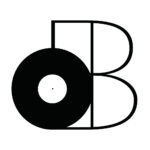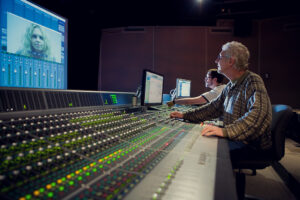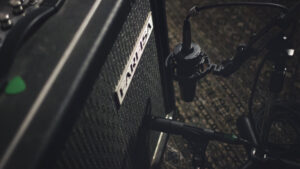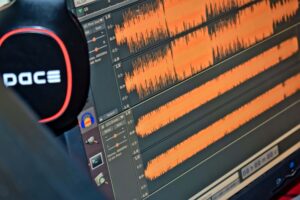The music industry has changed… If you’re planning to pay your bills, I understand why you’ve developed an interest in learning how to license your music for TV and film.
I don’t want to say it’s the only way, but it kind of is nowadays…
That being said, my objective today is to get you ready for one of the most exciting musical ventures you’ll ever take! This is what separates the STRONG from the weak, the GREAT from the mediocre.
Here’s what’s on the agenda for today…
- What kind of music gets TV/Film placements?
- What does your music need to be “broadcast-ready”?
- Where can you find sync licensing opportunities?
- Who can help you get your music on TV and film?
- When should you start submitting to music libraries?
- When you should start your own music licensing/publishing business
- How to submit your music to music supervisors and music libraries
- Summary: How to license your music for TV and film
What kind of music gets TV/Film placements?
That’s the burning question… If you haven’t asked yourself what kind of music gets TV/Film placements, then you’ll likely be wasting lots of time, energy and resources!
However, rest assured that most genres of music get TV/Film placements.
Here are the most POPULAR ones though:
- Orchestral/Cinematic
- Suspense/Tension
- Electronic
- Rock/Metal
- Funk/Pop
- Hip-Hop
- Latin
It’s just a question of HOW MANY placements your specific genre/style will generate for you.
That being said, music production for TV/Film placements is very similar to fashion. You’ll need to keep up to date with the latest trends and know how to “dress” your music to secure the best chances of succeeding.
It’s a question of genres/style.
It’s also a question of production techniques.
So, you’re probably wondering how to find out which genre (or genres) to start working on. It can seem overwhelming at first, I know. When I first got started, I stubbornly decided to keep making music the way I always had because I didn’t want to put in the RESEARCH.
It can seem counterintuitive to research music, but it’s actually the cure.
It’s what separates the great composers/producers from your “beatmaker” roommate (yeh, that guy).
Instead of resisting the urge to put yourself outside of your COMFORT ZONE, I suggest that you start embracing that aspect of music production. I’m so glad to have expanded my musical abilities into so many different genres.
It’s artistically liberating!
Before moving on, you need to start LOOKING AT/LISTENING TO the types of shows/movies you’d like to license your music for. If you don’t have that much time though, no worries.
The best place to find out what kind of music gets TV/Film placements is by studying the catalogs of royalty-free music websites.
Here are some examples (and the ones I usually consult):
- Pond5
- AudioJungle
- BMG PM
- RVRS Play
Just study the genres they’ve got stocked on their shelves.
For example, Pond5 makes it very easy to navigate their catalog using “keywords” that are frequently searched.

Just find something you like and start creating playlists/collections. Make an account if necessary and dedicate 15-30 minutes per day to study these tracks and use them as references when producing.
You’ll notice that it’s different from the music you’re used to hearing on streaming services.
However, that approach will only get you so far. You’ll need to SEE where the music is being used to understand how relevant those genres/styles are right now.
Maybe you want to license your music for anime series?
GREAT! What kind of music do you hear in anime nowadays?
What does your music need to be “broadcast-ready”?
Besides being “broadcast-ready”, your music also needs to be “licensable”. That’s another way of describing music that’s actually useful to the people you’ll be serving.
That’s right, you’re not making music for YOU (or your fans) anymore.
Here are some characteristics of “licensable” music:
- 2-3 minutes in duration
- Changes every 4-8 measures
- Lots of build-ups
- Lots of breaks
- Impactful ending
Besides these general characteristics, your production-quality also needs to be EXCELLENT.
That means your tracks DEFINITELY need to be mixed and mastered. Ideally, you’ll want to start doing that yourself because it’ll get quite expensive to delegate those tasks.
You’ll also need to equip your tracks with the proper METADATA.
That’s one of the most important words you’ll hear in sync licensing.
Without that priceless information, the chances of your music being found are slim to NONE. If you read the previous section and started doing your research, you’ll notice how important metadata is on websites like Pond5.
I encourage you to use those websites as models to create your own database.
The easiest way is to use spreadsheets.
You’ll also need to start making various edits or ALT-MIXES of your original track. That’ll make your music even more valuable by providing multiple options for different situations.
Here are some variations you might want to consider having:
- 15 Second
- 30 Second
- 60 Second
- No Vocals (if there were)
- No Leads
- Drum and Bass
However, the possibilities are endless. I also encourage you to get as creative as possible with your alternate versions. Each one should sound like its own thing.
Lastly, you’ll also want your music to be equipped with ISWC codes.
That’s how you’ll be earning your royalties and the only way to get them is by registering your music with performance rights organizations (PROs).
HOWEVER, you may want to hold back on doing that at first.
I’ll be explaining why later, but just keep in mind that SOMEBODY needs to register your music.
Once you’ve gotten all of these things together, you’ll finally be ready to start licensing your music for TV and film. That being said, we’ve still got lots of ground to cover so I hope you’ll keep reading on.
Now, things start getting interesting!
Where can you find sync licensing opportunities?
Where to begin… Just think about it, everything you watch usually has music and/or sound design so it’s not like there aren’t any opportunities to sync your music!
The question is WHERE to look for those opportunities.
You’ll quickly notice that the “hype” about getting TV/film placements kind of makes it feel like you’re looking to get signed by a record label though.
That being said, you’ll find many “opportunists” trying to sell you the idea that they can get your music in the right hands. I suggest staying away from those.
There are actually lots of scams going around the sync licensing industry, so be warned.
In reality though, opportunities to sync your music won’t just appear in your inbox. Of course, that doesn’t apply if you actually have CONTACTS in the industry!
That’s where I personally started.
I got my first TV placement through my mentor who hired me for a local ad campaign. You can see it HERE…
Here are some other places you can consider looking:
- LinkedIn (mostly the groups)
- Facebook (groups as well)
- Job Classifieds
- Industry Contacts
There are many platforms on the internet dedicated to connecting content creators, but it can quickly become overwhelming (and diluted).
I personally haven’t used any of the above EXCEPT my industry contacts.
The other (more passive) approach is to leverage the service offered by established music licensing platforms (also known as music libraries) to get your music placed in front of clients.
We’ll be talking more about music libraries in another section, but that’s where most begin.
I’ve already mentioned Pond5, so that’s one of the places you could consider.
If you’re going this route though, you’ll need to be MUCH more patient and to start building up your catalog to increase your chances of getting placements (more tracks = better odds).
The only disadvantage with royalty-free (or “non-exclusive” music libraries) is that you’re not building any RELATIONSHIPS. That’s something you’ll want to consider for the long run.
The more people know about you and your work, the more chances of you getting an email/phone call.
So, there’s ALWAYS work for musicians. Question is… Are you HUNGRY enough?
Who can help you get your music on TV and film?
Music supervisors, music libraries and other industry contacts. If you’ve got any of those around, there’s no reason why you shouldn’t be getting any placements.
Of course, it’s more of a numbers game.
However, the QUALITY of your contacts is just as important as the quantity. If you want to stay true to yourself, your music and your art… It’s best to surround yourself with like-minded individuals.
That’s why putting in the time and research at first is of the utmost importance.
Don’t just sign contracts with music libraries because they’re the only one that accepted you. Signing your music over doesn’t mean they’ll get you any placements. Remember that!
The best way to get QUICK placements is through music supervisors though.
That’s because they’re usually looking for music and they needed it YESTERDAY.
If you want to get your music in the hands of music supervisors, it’s not that difficult. It’s very easy to find the music supervisor that worked on your favourite show and/or series.
The credits are usually listed at the end (the part no one ever pays attention to, right?).
You can even look up the show and/or movie on IMDB to find out.
Once you have the name, it’s pretty simple… You need to REACH OUT! Whether you do it through LinkedIn, Twitter, phone and/or email doesn’t matter (we’ll be talking more about this later). You need to realize that these folks get THOUSANDS of submissions on the daily.
You just need to start thinking of HOW you’ll be approaching them.
As I said, we’ll be talking about that LATER.
Just start doing your research (I know, I keep repeating that) and taking note of these names. Once you’ve done your homework, you’ll be ready to show up at the right place at the RIGHT TIME.
Once you do, you might have an instant placement.
Seeking out mentors can also be quite rewarding. Maybe you can convince a music supervisor to mentor you? What about a music library owner?
I hope you see where I’m going with all of this…
You need to get BUSY. Start putting yourself out there and learning to deal with REJECTION.
When should you start submitting to music libraries?
There are TWO main paths to take if you want to license your music for TV and film. The first path involves submitting your music to music libraries and is the simplest of the two.
It’s simpler (and maybe easier) because the music library takes the responsibility of shopping your music to music supervisors.
That’s only if you’re dealing with EXCLUSIVE music libraries though.
| Income Source | Exclusive | Non-Exclusive |
| Royalties | Usually 50/50 | Usually 100% Yours |
| Sync Fees | *Custom Gigs Only | Percentage |
| Consideration Fees | Sometimes | Never |
| Blanket Fees | Rare | Never |
| Copyright | 100% Theirs | 100% Yours |
That graph basically outlines the differences between exclusive and NON-EXCLUSIVE music libraries (Pond5, AudioJungle, etc…).
As you can see, there are advantages and disadvantages with both.
What that graph doesn’t explain, however, is that exclusive music libraries take exclusive ownership of your intellectual property (sometimes in perpetuity). In other words, you can no longer control HOW your music will be used and WHERE.
That basically means picking the wrong music library to partner with can cost you LOTS of hard work and potentially LOTS of money.
Remember, getting your music accepted doesn’t guarantee its commercial viability.
That’s why I don’t recommend starting out with exclusive music libraries.
You should start submitting to exclusive music libraries only WHEN you’ve had some experience with non-exclusive music libraries.
That’ll give you some experience working with metadata and with marketing.
You should also have at least an entire 10-12 track ALBUM.
If you’re looking to get started TODAY though, you have nothing to lose by uploading your music to non-exclusive music libraries.
The fact that it’s non-exclusive means you’ll keep all your rights.
That also means you can submit to other non-exclusive music libraries.
Just keep in mind that you’re aiming for EXCLUSIVE music libraries in the long run. Remember what I said in the previous section? It’s all about building relationships.
It’ll also give you time to decide if you even want to go that route…
When you should start your own music licensing/publishing business
If you want to keep 100% control of your musical real estate, then starting your own music licensing/publishing company is the way to go!
Don’t worry though, it doesn’t need to be incorporated at first.
The only TWO prerequisites to start licensing music on your own are…
- Establishing a network
- Establishing a platform
I personally went this route because I LOVE BUSINESS.
Having your own “Decibel Peak” is a great way to attract potential buyers. It also establishes you as an authority figure and creates the sense of more perceived value.
Whether that’s the truth or an illusion, it works!
Of course, you also need to realize how much more work is required if you’re going to take 100% responsibility for the future of your music career.
That being said, the advantage is that you maximize PROFITS.
Remember, music libraries keep 100% of the sync fees which can actually be ENORMOUS. If only you knew how much they were banking on YOUR music.
They DO provide the service but if you can do it on your own, then DO IT!
In reality, you can start licensing music on your own whenever you summon the courage to start contacting music supervisors. You WILL be rejected MANY times, so get ready…
Sometimes you’ll just be ignored!
We’ll be talking about mitigating that in the next section.
For the time being, just focus on building your music catalog. You’re going to want to have more variety if you’re going out on your own because you’re essentially your own “music library”.
You won’t necessarily have the time to produce a track from scratch when you see an opportunity.
The more tracks you have in your catalog, the more equipped you are to win the gig.
How to submit your music to music supervisors and music libraries
I saved this section for last because I wanted you to BE READY. I want you to avoid burning any unnecessary bridges, so we want to make sure you don’t get flagged as SPAM.
That’s because throwing a bunch of your tracks at music supervisors doesn’t work.
Exclusive music libraries usually only accept FULL albums and it needs to be something they’re actually looking for. Same goes for music supervisors.
That means (once more), you’ll need to do your RESEARCH.
You want it to fill a “hole” in their catalog or present them with something they didn’t even know they needed and you need to explain WHY they need it in the first place.
That preparation needs to happen BEFORE you write the email.
If you feel like you’ve done your homework though, here’s an example:
Subject: 10 Track Album in the Style of Danny Elfman Ready for Exclusive Licensing
Hello,
My name is Stefan, I’m the music producer at Decibel Peak. I was studying your catalog and didn’t find any albums that could be used for emotional cinematic trailers.
I actually have an entire album of emotional cinematic music ready for exclusive licensing.
Here’s the link: [link]
I also made a mockup to demonstrate my work: [link]
I’m also looking for an active working relationship with a music library. I’m still relatively new to the scene, but I’ve got a well-researched catalog of high-quality tracks (some of them have already gotten placements).
Here’s one of my latest projects: [link]
I really appreciate your time and consideration. Let me know if we can discuss!
[contact info]
That would be for a music library.
Here’s an example for a music supervisor:
Subject: Orchestral music in the style of John Williams for Star Wars Episode X
Hello,
My name is Stefan, I’m the music producer at Decibel Peak. I recently found out that you were working on the next episode of the Star Wars franchise. Congrats!
It’s a shame that John Williams refused to work on this project, but I’ve been studying his composition style for years. I have an entire album of tracks in his style ready for exclusive placements!
Here’s the link: [link]
I’ve also created a mockup to demonstrate my work: [link]
I know you’ve got thousands of people contacting you, but I know that I’m the right person for the job. I’m also available to compose some custom tracks for the project if needed.
I sincerely appreciate your time, I hope that we can discuss this further at your convenience.
[contact info]
In the event of a hypothetical Star Wars Episode X, that would be GOLD!
BEFORE hitting send though, make sure that:
- You’ve got a .com domain email (ex.: [email protected])
- You’ve got an actual website (ex.: decibepeak.com)
- You’ve got somewhere to host your music (NO ATTACHMENTS)
That last one is EXTREMELY IMPORTANT.
SoundCloud isn’t really your best bet either. I recommend using your own website if you know how to set that up OR using a professional platform like SourceAudio.
That’s pretty much it though.
NOW, you’re ready to HIT SEND!!
Summary: How to license your music for TV and film
That was quite the read, but we’re finally here! Now, you might have LOTS of homework to do before hitting that send button but you’ve completed STEP 1; educating yourself.
Now it’s time to take action on the knowledge you’ve acquired!
The best place to start is (you guessed it) to start researching music libraries.
I’d start dedicating 15-30 minutes per day studying the music in the catalogs of the music libraries you come across. Pond5 is a great place to start!
Here are the ones I usually reference:
- Pond5
- AudioJungle
- BMG PM
- RVRS Play
Once you find some tracks you resonate with, save them for later. Start making playlists/collections (easily accomplished on Pond5).
Once you know what kind of music you’ll be making, you need to make sure it’s “licensable”.
Here are some guidelines to follow:
- 2-3 minutes in duration
- Changes every 4-8 measures
- Lots of build-ups
- Lots of breaks
- Impactful ending
Then you need to think about creating ALT-MIXES:
- 15 Second
- 30 Second
- 60 Second
- No Vocals (if there were)
- No Leads
- Drum and Bass
And just in case you haven’t noticed yet, most of the music you hear on TV and film is INSTRUMENTAL. That’s something to keep in mind!
It’s also important to start creating METADATA as soon as possible.
When looking for opportunities, remember who can help get your music placed:
- Music Supervisors
- Music Libraries
- Industry Contacts (mentors)
In the meantime though, you can always start working with non-exclusive music libraries to get your feet wet. However, you’ll eventually want to partner with one or two EXCLUSIVE music libraries or take the entrepreneurial path and transact with music supervisors directly.
Either way, you’ll need to make sure you have all your things together BEFORE reaching out.
At the very least, you’ll need a platform/website to work with (and show off).
If you’ve done all your homework and are consistently showing up at the right place at the RIGHT TIME… You’ll mitigate the risk of rejection, but get used to it.
Also, get used to being ignored outright (it’s nothing personal).
At some point though, you WILL get your music on TV and film. Once that happens, I would like you to come back to this post and leave a comment.
I’m sure it’ll inspire others as well, so let’s make it happen together!
If you have any questions, let me know. Just remember that I created Decibel Peak to assist musicians such as yourself to succeed on this path.
If you need any assistance, I’d be more than happy to help you by creating educational material to support you on your journey.
As always, thanks for reading!
Sources:
https://dittomusic.com/en/blog/how-to-submit-music-for-tv-and-film/
https://aristake.com/?post=105
https://newartistmodel.com/how-to-license-your-music-4-steps-to-get-started/








